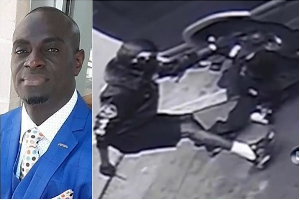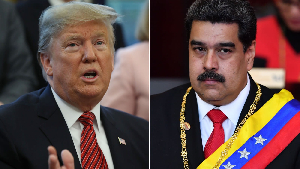A Feature by Paul Achonga Kwode
In the excruciating infertile Savannah stood a pale looking youngman who had
widely opened the mouth yawning for natural air for survival. He was bare chest as
he was not wearing any cloth and the only short-brown that hung around the waist was
multiple patched differently at the buttocks. The youngman’s strange look was not
only surprising but an indicative of the visible poverty in the countryside of
Nakolo, in the Upper East Region whose spectacle was not different from experiences
across the Savannah belts of Ghana. Bush fires at the Savannah was veritably
common and when the fires come, the do with the speed of the leopard and one could
hear the cry and pain of the dry leaves and trees as they endure the bitter fire.
The exposé of Anas Aremeyew Anas of the New Crusading Guide spread in the
Savannah like the wild bush fires and had again brought to the fore the deepening
state of institutional corruption in Ghana
especially among the revenue collectors of the country who were suppose to generate
money for our national coffers for social infrastructure and economic
development. What it therefore means is that the state is denied national
development and sacrificed for individual parochial interest with total impunity
while the masses of Ghanaians continue to wallop in abject poverty faced with lack
of hope and opportunities for the youth of this country. Institutional
corruption pervades all spheres of life in Ghana from the Customs Excise Preventive
Services (CEPS) to the Police, Driver and Vehicle Licenses Authority, the
Immigrations Service, the Ministries and Departments and virtually all institutions
in the country and surprisely among the private sector organisations.
Transparency International (TI) defined corruption operationally as “the abuse of
entrusted power for private gain” and added that bribe is paid to receive
preferential treatment for something that the bribe receiver is required to do by
law and at times paid to obtain services the bribe receiver is prohibited.
Among the devils of Max Weber’s bureaucracy was corruption which negatively affects
the smooth running of public institutions, depriving the state of deserved revenue,
rendering millions poorer and creating few riches in society. Such societies are
deemed unjust. It could slow the pace of development and create stratification
system making more people deprived of opportunities which otherwise would have
opened to all. Corruption, both institutional and political in Ghana has
been common since independence and probably started with Adam as a prominent
politician in Ghana echoed. According to the Wikipedia, a 1975 book, Victor T. Le
Vine wrote that bribery, theft and embezzlement arose from reversion to a
traditional winner-takes-all attitude in which power and family
relationships prevailed over the law. Since 2006, Ghana’s score and ranking on the
Transparency International Corruption Perception Index had improved slightly
however the growing perception in Ghana that government-related corruption is on
the rise as Anas’s story of the port officials exposes the facts glarely.
CORRUPTION AND SANCTIONS There have been several reports with
evidence from the ace investigative journalists Anas Aremeyew Anas and the recent
was when he investigated the cocoa smuggling along some borders of cocoa producing
areas but the strange happenings is that almost all the CEPS officials and others
who were being prosecuted had been freed due to judicial technicalities. One
therefore wonders whether the state is committed in fighting corruption in the
country and whether the President’s promise of dealing decisively with those
alleged corrupt officials had soon been forgotten. However,
we must commend the decisive interdictions of the 11 officials while we wait for
the due process to be followed. The major question that still lingers in the
minds of people is, why had all the officials caught in Anas’s video of cocoa
smuggling been freed and won’t such impunities entrench corruption especially among
the CEPS officials that after all nothing could be done to (him/her). Nonetheless,
another test case had beefed up with the fresher’s video of corruption at the Tema
Habour and the state cannot but to bring the perpetrators to book. It is not only
enough for the government to promise dealing with issue but to act and act
now-prosecute and retrieve the money lost to the state. According to
Professor Chris Abotchie, Senior Lecturer and a Criminologist of the University of
Ghana writing on the ‘Social Control in Traditional Southern Eweland of Ghana’
indicated that the war against crime continues unabated and it
appears to be no end immediately in sight adding that the world must win this war
at all cost, the search for more strategies must concentrate on measures that are
known to work and acknowledged the traditional methodology of punishment by the
gods, God, ancestral spirits, trial by ordeal, obedience to taboos as more
efficacious though outmoded. He emphasized that severe punishment operating in
escape-proof systems may be effectively deterrent but if those who succeed in
breaking the law do not suffer their due punishment “with dispatch”, the control
system tends to weaken. It is therefore clear that ineffective and weak
punitive measures and sanctions afford the potential or actual criminals either
room for risky criminal gambles or room for clandestine maneuvers as it is the case
with corrupt officials. Delays in the modern judiciary system open to investigating
police officers, prosecution officers, magistrates, judges and witnesses and
the accused, avenues for bribery and corruption making the system full of cyclical
exploitations and frustrations. Prof. Abotchie observed that justice
that has been delayed appears to be justice denied, the moral scruples which enable
conformists to restrain their own deviant inclinations that lacks social validation
and the cumulative effect on the social control mechanism are debilitating.
Needless to say, it should be emphasize that no society genuinely desirous of crime
control ought to be more interested in the detailed aftermath of the criminal act
than in its deterrence therefore severe punishment of the alleged corrupt officials
of Anas’s video must be dealt with decisively (with dispatch) as a deterrent.
CHRAJ AND EOCO The constitutionally mandated state
institutions; the Commission of Human Rights and Administrative Justice (CHRAJ) and
the Economic and Organised Crime Office
(EOCO) formally of the Serious Fraud Office appears to have failed the citizenry
and the nation by not taking any steps or interest in Anas’s exposé. These two
institutions have been mandated among other things to investigate and prosecute
corruption in a bid to reduce its carnage in the country. The 1992 constitution
provided for the establishment of CHRAJ charged with investigating all instances of
alleged suspected corruption and the misappropriation of public funds by officials.
The Commission is also authorized to take appropriate steps, including providing
reports to the Attorney General and the Auditor-General, in response to such
investigations. The Commission also has the mandate to prosecute alleged
offenders when there is sufficient evidence to initiate legal actions. In 1998, the
Government of Ghana also established an anti-corruption institution, called the
Serious Frauds Office (SFO), otherwise the Economic and Organised
Crime Office (EOCO) to investigate corrupt practices involving both private and
public institutions. A new law that revised the SFO law is aimed at defining more
clearly treatment of the proceeds from criminal activities. These two institutions
are therefore being reminded of their duties. The government passed a
“Whistle Blower” law in July 2006, intended to encourage Ghanaian citizens to
volunteer information on corrupt practices to appropriate government agencies. As
of February 2011, a Freedom of Information bill was still pending in Parliament and
the bill when passed, will enable more exposés of public officials while fortifying
journalists to work without fear and intimidation in seeking for public interest
information. Government and parliament must also be reminded that journalists need
the Freedom of the Information Bill passed now than ever.
ANAS; PRIDE OF GHANAIAN JOURNALISTS
As was expected, Ghanaians seems to be happy with the interdictions of the 11
officials who were involved in the bribery scandal but till the face prosecution,
the hearts of many will continue to demand for that. Also, the criticisms and
political arguments associated with the Anas' investigations must be
dispassionately done not to erode the gains of the investigative piece.
Every journalist would have wished to do what Mr. Anas of the New Crusading Guide
is doing in helping build a Better Ghana. He is therefore not only an icon in
Ghanaian and international inky fraternity but a pride to Ghanaian Journalists. It
is not the awards that fraternizes me in particular but at least journalists in
Ghanaian media will at least be given much respect per his exposé akin to the adage
that the pen is mightier than the sword. Journalism which is often referred to as
the fourth estate of the realm is perhaps the least respected and rewarded but I am
yet reminded that a good name is better than riches. My fervent hope is for
Anas and the New Crusading Guide to train more dedicated, incorruptible and
patriotic investigative journalists to be like himself in Ghana to continue
exposing the roots in our public institutions but it is sad to know that most media
institutions in the country have no interest in investigative journalism let alone
funding their journalists to investigate malfeasance. It is also a time for
Ghanaian journalists to do self introspection since journalists are not saints and
could also be corruptible. Long live the inky fraternity in its efforts at
contributing in building a better Ghana and a sound economic and democratic
environment devoid of discrimination, respect to human rights and the rule of law
to usher mother Ghana to a first world country while hoping that all institutions
and the Government would give the media the due
support.Email;pkachonga@yahoo.comEND
Opinions of Saturday, 12 February 2011
Columnist: Kwode, Paul Achonga














